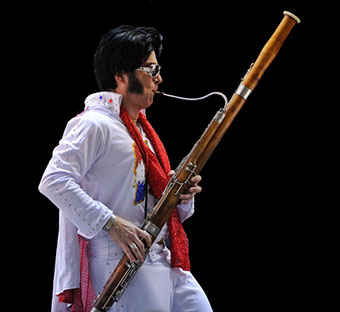Elvis is Still in the Building
by Jan Jezioro

The Buffalo Chamber Players revive(?) a legend
The Buffalo Chamber Players have earned a well deserved reputation for programming underplayed, and sometimes completely obscure musical works, and they will be working hard in their season’s final concert on Wednesday, June 8, at 7:30pm in the Buffalo Seminary, to preserve that reputation.
At their last previous concert the BCP jumped into new territory with the world premiere of Rob Deemer’s Sex & Politics. In this work, Deemer, the group’s first-ever composer-in-residence, innovatively set six poems by the American iconoclastic poet e. e. cummings. Soprano Tony Arnold’s dramatically vibrant interpretation had audience members asking about the possibility of a future commercial recording of his new piece. Building on that success, artistic director Janz Castelo says that for this concert “I programmed three pieces: by Aaron Copland, George Rochberg and Michael Daugherty, works that could only have been written by Americans and the result is. I think, an evening of life-changing music.”
A couple of season’s back, the BCP hosted a memorable recreation of the premiere Buffalo production of the staged version of Igor Stravinsky’s L’histoire du soldat, which had taken place a half-century earlier, amazingly enough, in the exact, same venue, the Buffalo Seminary Chapel, that is home to the BCP. In a nod to Stravinsky’s work, Daugherty composed his 1993 work Dead Elvis, for bassoon, clarinet, trumpet, trombone, violin, double bass, and percussion, the same unusual combination of instruments that Stravinsky had used for his L’histoire du soldat. Musically, the character of the dead Elvis is personified by the bassoon, an instrument that not only does not get much musical respect, but is often used to humorous effect. While Stravinsky’s violinist sells his soul to the devil to obtain great wealth, in Daugherty’s work, Elvis sells his soul to the record companies, Hollywood, and ultimately, Las Vegas. Classical music lovers need not fret unduly, however: the Dies Irae, the medieval chant for Judgment Day, is the main musical motive for the work, and it appears, in one form or another, in every section of the piece, in which the life course of the rock and roll legend is traced, from magnetically virile teen-age heart throb, to burned out Vegas lounge act. Also, in Daugherty’s quest for an enhanced musical experience, the score requires the bassoonist to suit-up as Elvis—young Elvis or old Elvis is not specified.
Culture in Cinema returns to the Bolshoi Ballet
Back in March, the Paris Opera was featured in a live simulcast of a superb new production of Léo Delibes’ popular ballet Coppélia, about a mechanical dancing doll that distracts a village swain from his beloved and appears to come to life. Based on “The Sandman” and “The Doll,” a pair of macabre stories by that quintessentially early Romantic writer E. T. A. Hoffman, Coppélia became Delibes’ first success, even though it’s initial run was interrupted by the Franco-Prussian War and the siege of Paris. The Bolshoi Ballet’s classic production of Coppélia will be simulcast on Sunday, May 29 at 11am, in the Amherst Theatre (3500 Main Street across from UB South Campus), which has been specially upgraded to accommodate the Culture in Cinema series. Visit: www.dipsontheatres.com.
A special guest, BPO associate conductor Matthew Kraemer, will lead the BCP in George Rochberg’s Music for the Magic Theater, a 1967 work that the composer wrote after the death of his young son. Before writing this work, Rochberg had used the modernist technique of serialism for over a decade, but following the death of his child he abandoned it, saying that “serialism was empty of expressive emotion and was inadequate to express his grief and rage.” Rochberg notes that he embraced “a kind of sound-collage in which the past and present are quite literally juxtaposed.” Attempting to retrieve the entire experience of Western music, “Rochberg summons a varied roster of composers and styles: Mozart (Divertimento, K. 287, Adagio), Beethoven (String Quartet, op. 130), Mahler (Symphony No. 9, Adagio), Webern (Concerto for Nine Instruments, op. 24), Varèse (Déserts), Stockhausen, (Zeitmasse Nr. 5), Miles Davis (Stella by Starlight). Somewhat surprisingly, Rochberg has explained that his choices were not totally random, and that he had been drawn to each of these quotations because they shared a three-tone, descending, half-step progression.”
The BPO has a long-standing relationship with Rochberg’s work, having premiered an orchestrated version of the work in 1969, under the baton of Melvin Strauss.
Commissioned by choreographer and dancer Martha Graham in 1945, Copland’s Pulitzer Prize-winning Appalachian Spring quickly became an audience favorite. Often heard in its orchestrated version, the work will be presented in its original chamber version for 12 players.
In the aftermath of last weekend’s heavy vandalism spree in Delaware Park, the Buffalo Chamber Players have pledged to donate 20 percent of all ticket sales for this concert to the Olmstead Conservancy.
Tickets: $15/$5 students, at www.buffalochamberplayers.org and at the door.
blog comments powered by Disqus|
Issue Navigation> Issue Index > v10n21 (Week of Thursday, May 26) > Elvis is Still in the Building This Week's Issue • Artvoice Daily • Artvoice TV • Events Calendar • Classifieds |









 Current Issue
Current Issue